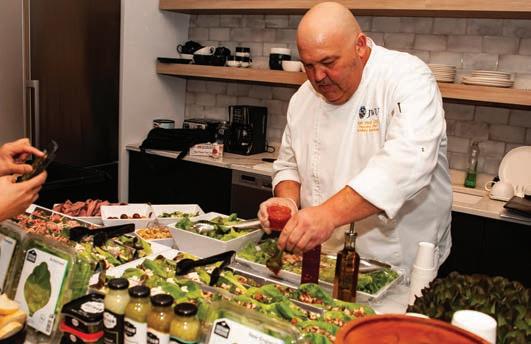
3 minute read
Chef Ann Cooper, CEC
from National Culinary Review (March/April 2022)
by National Culinary Review (an American Culinary Federation publication)
Founder, Chef Ann Foundation // B y Amelia Levin
glamorous side of chefdom for 25 years and wanted things to stay that way, quickly turned down the offer. The school’s founder, Courtney Ross, tried again, asking Chef Cooper to come visit, so she obliged. Turns out, Ross was a visionary who foresaw a new foodservice program showcasing organic, local and sustainable food — still a novel idea at the time, especially in the K-12 sector. It was even a goal to build a school garden and incorporate learnings from that into the academics. Chef Cooper, who had cooked for plenty of highend philanthropic chef events and had partnered with Share Our Strength and other major nonprofits, was intrigued.
People know her as the “Renegade Lunch Lady” who has helped transform school nutrition programs at tens of thousands of schools across the country, impacting millions of children and the communities surrounding them. But before that, Chef Ann Cooper, CEC , was a fast-rising chef in the white tablecloth world of the 90s.

From 1990 to 1999, Chef Cooper, a Culinary Institute of America graduate of ‘79, served as executive chef of The Putney Inn in Vermont. Little did she know that her career path would change drastically at the end of that tenure, when she was approached by Ross School, a private K-12 facility in East Hampton, New York, to develop a brand new foodservice program.
At first, Chef Cooper, who had been heavily immersed in the more
“So I did it. I left the white tablecloth world and became a lunch lady,” Chef Cooper says jokingly. “But I stayed in school foodservice from then until a year ago when I retired.”
As executive chef and director of wellness and nutrition for the Ross School, Chef Cooper fought to break the school foodservice mold that was (and dare say it, still is) heavily embedded in the throes of politics, corporate handouts and restrictive guidelines. She fought not only to feed children food that was grown sustainably without pesticides and preservatives but also to teach children about the importance of that food for their bodies and the planet — part of a movement toward sustainability before the term “farm-totable” was even a thing.
“Ross School had a high profile at the time,” Chef Cooper says, “so we got a lot of press covering what we were doing. Alice Waters came out to see us, telling us this is what she wanted. She got me to go to California and head the foodservice program for the Berkeley Unified School District.”
It was there, in the mid-2000s, that Chef Cooper came up with the idea for The Lunch Box, a toolkit (now a web portal with free and accessible tools, recipes and resources) for foodservice directors and K-12 school leaders looking to develop from-scratch, healthy and sustainable school nutrition programs. Chef Cooper also became an integral part of Waters’ The Edible Schoolyard Project while serving as foodservice director for Berkeley Unified School District.
In 2009, Chef Cooper left to become the foodservice director for the Boulder Valley School District in Colorado. Looking to further her work on The Lunch Box, she subsequently founded the Chef Ann Foundation, a 501(c)(3) nonprofit with a mission of “helping schools take action so that every child has daily access to fresh, healthy food.”
And that’s where she became known as the “Renegade Lunch Lady,” a woman whose work has helped a whopping 4 million children in 12,000 schools across the country. Today, Chef Cooper remains a partner of Lunch Lessons, LLC, a consultancy for school districts going through large-scale food change. Prior to the pandemic, she was a regular speaker at industry conferences. She has written four books uncovering problems with America’s food supply chain and offering solutions for school food reform and a more sustainable future.
Chef Cooper also started the School Food Institute, an online education center for school foodservice program developers. “We’ve had thousands of people take the classes and have run apprenticeship and fellowship programs in partnership with California Community Colleges,” she says. “You can spend a lot of time thinking about the food, but if you don’t have the staff to cook the food, it doesn’t do any good.”
Just as she was and is a pioneer in school foodservice reform, Chef Cooper was also a pioneer in the ACF community as one of the first few women members and certified executive chefs.
“When I first joined ACF as a young chef, I was really involved,” says Chef Cooper, who has come back as a presenter for events. “I went to a lot of the conferences, competed in many competitions and even won some gold medals.” But she was often the only woman competing — until she encouraged others to join her.
“I was once working on a cruise ship and had a chef literally tell me, ‘a woman’s place is in the bedroom, not the kitchen,’” says Chef Cooper, who even wrote a book by a similar name: “A Woman’s Place Is in the Kitchen: The Evolution of Women Professional Chefs,” published in 1997. She also spent years serving as president and board member for Women Chefs and Restaurateurs.
Knowing women bring many strong traits to a commercial kitchen — vision, empathy, compassion, humility — Chef Cooper has been just as much a champion for women chefs as for school children.

“Everyone’s idea needs to be counted; it’s important to work toward inclusivity,” Chef Cooper says. “As a country, we need to do more to prioritize this, as well as education and healthy food. But I see many changes on the horizon.”










